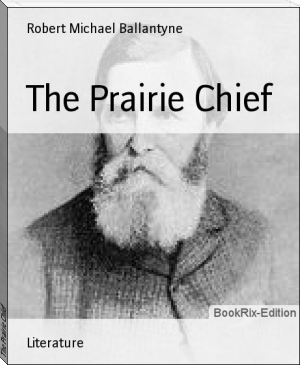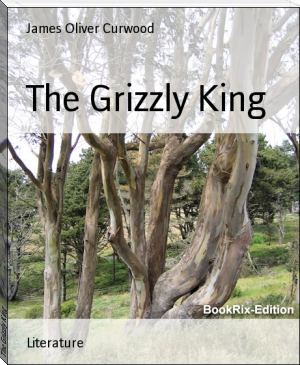The Prairie Chief, Robert Michael Ballantyne [best ereader for graphic novels .TXT] 📗

- Author: Robert Michael Ballantyne
Book online «The Prairie Chief, Robert Michael Ballantyne [best ereader for graphic novels .TXT] 📗». Author Robert Michael Ballantyne
"Sartinly it's the biggest that I've ever clapped eyes on," he thought but he did not speak or move. So anxious was he not to scare the animal, that he hardly breathed.
Bruin seemed to entertain suspicions of some sort, for he sniffed the tainted air once or twice, and looked inquiringly round. Coming to the conclusion, apparently, that his suspicions were groundless, he walked straight up to the lump of buffalo-meat and sniffed it. Not being particular, he tried it with his tongue.
"Good!" said the bear--at least if he did not say so, he must have thought so, for next moment he grasped it with his teeth. Finding it tethered hard and fast, he gathered himself together for the purpose of exercising main force.
Now was Little Tim's opportunity. Slipping a cord by which the net was suspended to the four stakes, he caused it to descend like a curtain over the bear. It acted most successfully, insomuch that the animal was completely enveloped.
Surprised, but obviously not alarmed, Bruin shook his head, sniffed a little, and pawed the part of the net in front of him. The hunter wasted no time. Seeing that the net was all right, he pulled with all his might on the main rope, which partly drew the circumference of the net together. Finding his feet slightly trammelled, the grizzly tried to move off, but of course trod on the net, tripped, and rolled over. In so doing he caught sight of the hunter, who was now enabled to close the mouth of the net-purse completely.
Being by that time convinced, apparently, that he was the victim of foul play, the bear lost his temper, and tried to rise. He tripped as before, came down heavily on his side, and hit the back of his head against a stone. This threw him into a violent rage, and he began to bounce.
At all times bouncing is ineffectual and silly, even in a grizzly bear. The only result was that he bruised his head and nose, tumbled among stones and stumps, and strained the rope so powerfully that the limb of the tree to which it was attached was violently shaken, and Little Tim was obliged to hold on to avoid being shaken off.
Experience teaches bears as well as fools. On discovering that it was useless to bounce, he sat down in a disconsolate manner, poked as much as he could of his nose through one of the meshes, and sniggered at Little Tim, who during these outbursts was naturally in a state of great excitement. Then the bear went to work leisurely to gnaw the mesh close to his mouth.
The hunter was not prepared for this. He had counted on the creature struggling with its net till it was in a state of complete exhaustion, when, by means of additional ropes, it could be so wound round and entangled in every limb as to be quite incapable of motion. In this condition it might be slung to a long pole and carried by a sufficient number of men to the small, but immensely strong, cage on wheels which the agent had brought with him.
Not only was there the danger of the bear breaking loose and escaping, or rendering it necessary that he should be shot, but there was another risk which Little Tim had failed at first to note. The scene on which he had decided to play out his little game was on the gentle slope of a hill, which terminated in a precipice of considerable height, and each time the bear struggled and rolled over in his network purse, he naturally gravitated towards the precipice, over which he was certain to go if the rope which held him to the tree should snap.
The hunter had just become thoroughly alive to this danger when, with a tremendous struggle, the bear burst two of the meshes in rear, and his hind-quarters were free.
Little Tim seized his gun, feeling that the crisis had come. He was loath to destroy the creature, and hesitated. Instead of backing out of his prison, as he might easily have done, the bear made use of his free hind legs to make a magnificent bound forward. He was checked, of course, by the rope, but Tim had miscalculated the strength of his materials. A much stronger rope would have broken under the tremendous strain. The line parted like a piece of twine, and the bear, rolling head over heels down the slope, bounded over the precipice, and went hurling out into space like a mighty football!
There was silence for a few seconds, then a simultaneous thud and bursting cry that was eminently suggestive.
"H'm! It's all over," sighed Little Tim, as he slid down the branch to the ground.
And so it was. The bear was effectually killed, and the poor hunter had to return to the Indian village crestfallen.
"But hold on, stranger," he said, on meeting the agent; "don't you give way to despair. I said there was lots of 'em in these parts. You come with me up to a hut my son's got in the mountains, an' I'll circumvent a b'ar for you yet. You can't take the cart quite up to the hut but you can git near enough, at a place where there's a Injin' friend o' mine as'll take care of ye."
The agent agreed, and thus it came to pass that at the time of which we now write, Little Tim was doing his best to catch a live bear, but, not liking to be laughed at even by his son in the event of failure, he had led him and his bride to suppose that he had merely gone out hunting in the usual way.
It was on this expedition that Little Tim had set forth when Whitewing was expected to arrive at Tim's Folly--as the little hut or fortress had come to be named--and it was the anxiety of his friends and kindred at his prolonged absence which resulted, as we have seen, in the formation and departure of a search expedition.
CHAPTER NINE.
A DARING EXPLOIT.
To practised woodsmen like Whitewing and Big Tim it was as easy to follow the track of Little Tim as if his steps had been taken through newly-fallen snow, although very few and slight were the marks left on the green moss and rugged ground over which the hunter had passed.
Six picked Indians accompanied the prairie chief, and these marched in single file, each treading in the footsteps of the man in front with the utmost care.
At first the party maintained absolute silence. Their way lay for some distance along the margin of the brawling stream which drained the gorge at the entrance of which Tim's Folly stood. The scenery around them was wild and savage in the extreme, for the higher they ascended, the narrower became the gorge, and the masses of rock which had fallen from the frowning cliffs on either side had strewn the lower ground with shapeless blocks, and so impeded the natural flow of the little stream that it became, as it were, a tormented and foaming cataract.
At the head of the gorge the party came to a pass or height of land, through which they went with caution, for, although no footsteps of man had thus far been detected by their keen eyes save those of Little Tim, it was not beyond the bounds of possibility that foes might be lurking on the other side of the pass. No one, however, was discovered, and when they emerged at the other end of the pass it was plain that, as Big Tim remarked, the coast was clear, for from their commanding position they could see an immeasurable distance in front of them, over an unencumbered stretch of land.
The view from this point was indeed stupendous. The vision seemed to range not only over an almost limitless world of forests, lakes, and rivers--away to where the haze of the horizon seemed to melt with them into space--but beyond that to where the great backbone of the New World rose sharp, clear, and gigantic above the mists of earth, until they reached and mingled with the fleecy clouds of heaven. To judge from their glittering eyes, even the souls of the not very demonstrative Indians were touched by the scene. As for the prairie chief, who had risen to the perceptions of the new life in Christ he halted and stood for some moments as if lost in contemplation. Then, turning to the young hunter at his side, he said softly--
"The works of the Lord are great."
"Strange," returned Big Tim, "that you should use the very same words that I've heard my daddy use sometimes when we've come upon a grand view like that."
"Not so strange when I tell you," replied Whitewing, "that these are words from the Book of Manitou, and that your father and I learned them together long ago from the preacher who now lies wounded in your hut."
"Ay, ay! Daddy didn't tell me that. He's not half so given to serious talk as you are, Whitewing, though I'm free to admit that he does take a fit o' that sort now an' again, and seems raither fond of it. The fact is, I don't quite understand daddy. He puzzles me."
"Perhaps Leetil Tim is too much given to fun when he talks with Big Tim," suggested the red chief gravely, but with a slight twinkle in his eyes, which told that he was not quite destitute of Little Tim's weakness--or strength, as the reader chooses.
After a brief halt the party descended the slope which led to the elevated valley they had now reached, and, having proceeded a few miles, again came to a halt because the ground had become so rocky that the trail of the hunter was lost.
Ordering the young men to spread themselves over the ground, Whitewing went with Big Tim to search over the ridge of a neighbouring eminence.
"It is as I expected," he said, coming to a sudden stand, and pointing to a faint mark on the turf. "Leetil Tim has taken the short cut to the Lopstick Hill, but I cannot guess the reason why."
Big Tim was down on his knees examining the footprints attentively.
"Daddy's futt, an' no mistake," he said, rising slowly. "I'd know the print of his heel among a thousand. He's got a sort o' swagger of his own, an' puts it down with a crash, as if he wanted to leave his mark wherever he goes. I've often tried to cure him o' that, but he's incurable."
"I have observed," returned the chief, with, if possible, increased gravity, "that many sons are fond of trying to cure their fathers; also, that they never succeed."
Big Tim looked quickly at his companion, and laughed.
"Well, well," he said, "the daddies have a good go at us in youth. It's but fair that we should have a turn at _them_ afterwards."
A sharp signal from one of the young Indians in the distance interrupted further converse, and drew them away to see what he had discovered.





Comments (0)